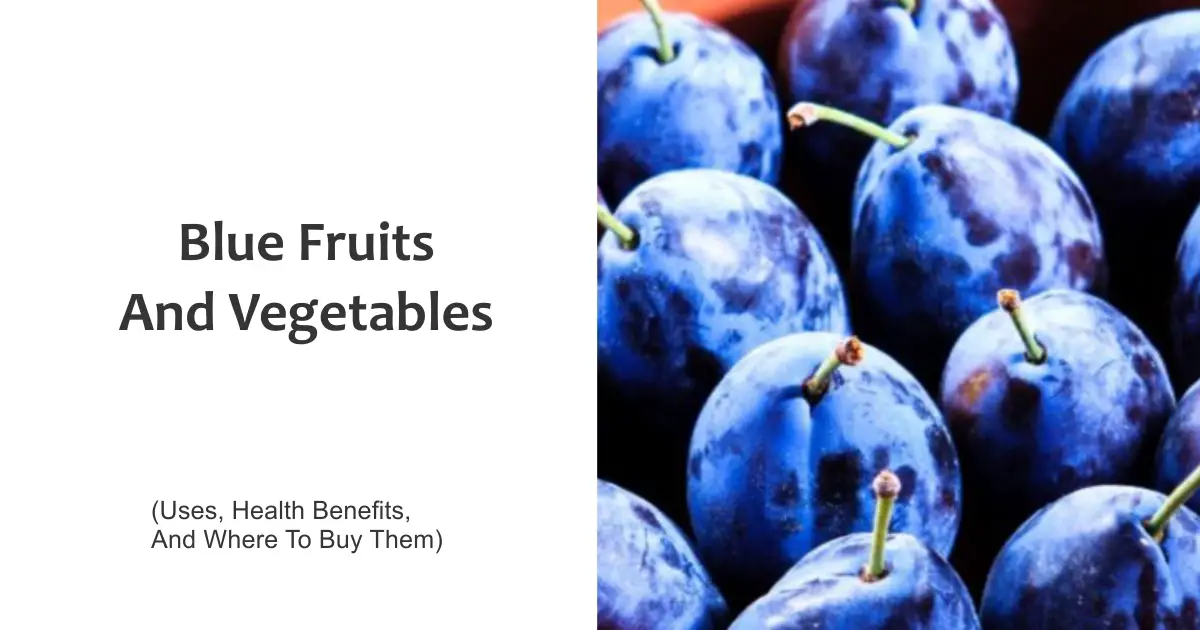Fruits are a very important part of our diets. You must have heard the saying ” eat the rainbow”. This statement alludes to the fact that you should have a diverse variety of colorful and vibrant fruits on your plate.
Blue fruits, in particular, are foods that you should not do without. Blueberries, black currants, black berries, and elderberries are some blue-colored fruits that you should add to your diet.
Why the blue color?
The blue color of these fruits is as a result of a substance called anthocyanin. It comes from a combination of two Ancient Greek words, “anthos” and “kuaneos”, meaning flower and dark-blue, respectively. Anthocyanin is in a class of plant nutrients called flavonoids. Flavonoids are pigments generally. Anthocyanin happens to fall under those that are blue. They are responsible for the characteristic color that you see in blue fruits.
These anthocyanins aren’t just all about color. Anthocyanins are also very good for your health.
They are one of the major reasons why blue fruits are called brain food. They help to slow cognitive decline, can sharpen motor skills, and can also help to prevent memory loss.
Another set of nutrients that are found in blue fruits are polyphenols. Polyphenols are plant compounds that have very strong antioxidant properties. They are also classified as flavonoids. Their antioxidant properties are very crucial to neutralizing free radicals.
Free radicals are produced in the body during energy formation in the cell’s mitochondria. During this process, free oxygen molecules are converted to harmful substances called reactive oxidative species. Naturally, cells are equipped with enzymes that can neutralize these reactive oxidative species.
However, if the production of these oxidative species surpasses that of the cell’s antioxidants, these oxidative species can cause damage to some important components in the cell. These radicals can cause mutations in DNA, and this is one of the causes of cancer.
In addition, these free radicals can also increase the likelihood of inflammation occurring. This can lead to heart disease and Alzheimer’s disease.
This is where antioxidants come in. They help to neutralize these free radicals that could cause damage to your cells. This is where polyphenols come in. They help to supplement the body’s own production and bolster, where there might be deficiencies.
Resveratrol is another substance that is found in some blue fruits. It is found in the skins of fruits such as grapes, blueberries, and raspberries. They are stilbenoids, which are produced by plants. They belong to the class of polyphenols. They have also been hailed for their antioxidant and anti-inflammatory properties. It is reported to have anti-aging and anti-cancer properties too.
Different Blue Fruits with Their Uses and Benefits
I am going to list some wonderful blue fruits that you should have in your diet, alongside what they offer to your health and ways you can also use them.
Blueberry
Blueberries are known for their characteristic bluish hue. They are a member of the heather family of the Vaccinium species. Others in this family are cranberries and huckleberries. The two most common varieties are the highbush and lowbush varieties.
These small rounded fruits can be eaten raw, frozen, or even juiced. You are not out of options in how you want to consume them. They can be baked into pies, made into jams, etc.
Blueberries, though quite low in calories, are full of various vitamins and minerals. Below is the calorie count.
100 grams of blueberries give:
- 57 Calories
- 84% water
- 0.7 g of Protein
- 14.5 g of carbs
- 10 g of sugar
- 2.4 g of fiber
- 0.3 grams of fat
Blueberries are low on the glycemic index. This index measures how quickly a food can raise blood sugar. With a score of 53, taking blueberries will not be harmful to those with diabetes.
In addition to all these, blueberries have some other vitamins and minerals. They include:
- Vitamin C: Vitamin C is also a powerful antioxidant for neutralizing free radicals. Also known as ascorbic acid, the intake of vitamin C can help to boost and bolster your immune system. It is also important for the maintenance of your teeth and gums. A cup of blueberries can contribute to 25% of your recommended daily intake of vitamin C.
- Vitamin K: Blueberries are a wonderful source of vitamin K. This vitamin is especially important in blood clotting. A cup of blueberries will give you about 28 micrograms of vitamin K. This is more than enough.
- Manganese: Blueberries are rich in manganese. Manganese helps the body with essential nutrient metabolism. This includes amino acids, protein and lipid metabolism.
In addition to all these, blueberries also contain some amounts of vitamin E, vitamin B6 and copper.
Blackberries
Blackberries are yummy fruits that come packed with a lot of flavor. They are generally sweet with a tart taste. They are not just nice to the taste buds, but are dense with nutrients.
Blackberries belong to the family of Rubus. Due to their similar appearances, blackberries could be confused with raspberries. However, a way to distinguish the two is whether or not the stem stays with the fruit when picked. When picking a blackberry, the stem or receptacle stays with the fruit.
On the other hand, when raspberries are picked, the stem stays with the plant, and a hollow is left on top of the fruit.
Blackberries come with so many health benefits. They are packed with a lot of vitamins and minerals. Below is the nutritional content of a cup serving of blackberries:
- 62 calories
- 13.8 g of carbs.
- 7.63 g of fiber.
- 7.03 g of sugar.
- 7% of the daily value of manganese.
- 5% of the daily value of potassium.
- 34% of the daily value of vitamin C.
- 11% of the daily value of vitamin E.
- 24% of the daily value of vitamin K.
The health benefits are numerous. I will be listing some:
- Packed with Vitamin C: A cup of blackberries can provide 30 mg of Vitamin C. That is about 34% of the recommended daily intake of vitamin C. Vitamin C plays a huge role in collagen formation and the maintenance of the bone structure.
- Some other things vitamin C helps do are wound healing, absorbing iron, neutralizing free radicals, preventing scurvy, etc.
- High in fiber: Blackberries are quite high in fiber. Fibers are important for the diet because they help to ease digestion. Fiber generally can help you to do the following:
- Promote good bowel movement.
- Slows the rate of sugar absorption.
- Lowers cholesterol.
- Helps the brain: Due to the richness of blackberries in antioxidants, they are useful for promoting brain health. The antioxidants in blackberries can help to neutralize free radicals that can damage the brain neurons as you age. They can slow cognitive decline and help prevent motor issues that could come as a result of aging.
Blackcurrants
Blackcurrants from the genus Ribes are considered a superfood in the United Kingdom. However, in the United States, they have been removed from some areas due to the fact that they help spread a fungus that affects white pine. In spite of this, what happens to be one country’s loss is another’s gain.
Blackcurrants are so good on the taste buds. They might be tart when unripe, but once ripened, they are quite sweet. They come packaged with a lot of nutrients, and this is why they are called “super foods.”
Black currants are very versatile too, as they can be used from the fruit to the seed and even the leaves. The leaves can be used to make infusions and tea.
The nutritional content of black currant is as follows. A cup serving of black currants offers
- 71 calories
- 17.2 g of carbs.
- 1.57 g of proteins.
- 361 Mg of potassium, which is 8% of the daily value.
- 13 mcg of Vitamin A, which is 1% of the daily value.
- 202.7mg of Vitamin C, which is 225% of the daily value.
Blackcurrants are so rich in nutrients that a cup serving of black currants gives about 4 times the amount of vitamin C in oranges, and even twice the amount of antioxidants in blueberries.
Some health benefits of blackcurrants include:
- Bolsters the immune system: As they are very high in vitamin C, blackcurrants will help your immune system fight off infections and diseases with ease.
- Promotes eye health: Blackcurrants can help treat glaucoma. They have a high level of antioxidants that can promote good blood flow to the eyes. This can help slow the progression of glaucoma.
- Prevents inflammation: Blackcurrants are rich in gamma-linoleic acid. This is an omega-6 fatty acid that helps to reduce inflammation. It also alleviates symptoms in cases of rheumatoid arthritis.

